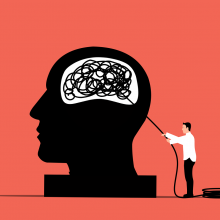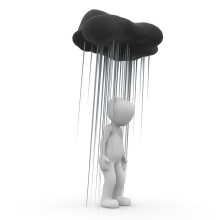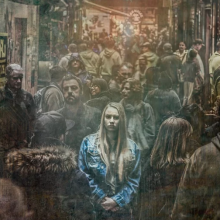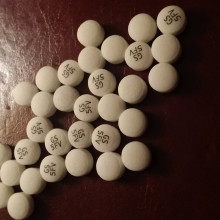Antidepressants: the ongoing debate
We'll be exploring depression, what causes it, and whether antidepressants or other treatments hold the key to solving it. Amongst our guests is psychologist Gordon Harold, speaking on how depression manifests in patients, and we'll also hear from psychiatrists on both sides of the antidepressant debate: Hamish McAllister Williams and Joanna Moncrieff.
In this episode

00:41 - Coming off antidepressants
Coming off antidepressants
Mark Horowitz, UCL
Around one in six adults in the UK experience moderate to severe depressive symptoms, with antidepressants often prescribed to help treat them. 8 million people are currently taking them among a population of about 65 million. Mark Horowitz is a clinical research fellow at University College London and spoke about his own run-in with depression and taking antidepressants…
Mark - I was diagnosed with depression when I was 21. I had a number of things going on in my life. Wasn't very happy with my course. I'd had a reasonably difficult time during my education fitting in. Came from an immigrant family. I was prescribed antidepressants by my GP. I've always asked what the effect was. I can't really remember whether it had a positive effect on my mood or not, but I do remember a number of side effects. I felt dizzy. I had a sort of change in sensations. I eventually decided to stop them after being on them for 15 years. And the reason why I wanted to stop them was I was very tired all the time and I started to develop trouble with memory and concentration, and I wondered whether it was due to the medication and that's why I wanted to try to stop it.
Will - And so what happened next when you came off them?
Mark - What happened next was actually the most troubling experience of my life. Soon after reducing, which I did over a few months, I had trouble sleeping and I would wake up in the mornings with incredible panic, like I was being chased by a wild animal, you know, with a cold sweat. And I would be in a state of panic for hours and hours. It would eventually get a bit of relief in the evenings. I'm a little bit of a couch potato, but I took up running quite a few kilometres a day until my feet bled just because it gave me a little bit of relief from that terrifying sensation that I had. I also felt dizzy and things around me seemed quite dreamlike. And that went on for weeks and weeks and weeks. And eventually I couldn't handle it anymore. I understood it was withdrawal symptoms because it wasn't anything like the kind of neurotic symptoms that put me on the drugs in the first place. And I ended up going back to the medication in order to resolve those withdrawal symptoms. I learned a few years later a better technique for coming off, which involves going off even more slowly, down to very low doses. I am using a liquid version of the drug, and I'm currently in the tail end of coming off the drugs at the moment.

03:14 - What happens to us during depression?
What happens to us during depression?
Hamish McAllister-Williams, Newcastle University
What exactly is depression and how have we traditionally managed the symptoms? Hamish McAllister-Williams is a consultant psychiatrist and a professor of affective - or mood - disorders at Newcastle University. He spoke first about what we know about what’s going on inside someone’s head when they have a depressive episode…
Hamish - Depression is probably a number of different conditions rather than just one disorder. One of the major features is feeling low or sad in mood, but there are different underlying abnormalities within the brain that may actually lead to those symptoms. What we do know is that if you look at a group of people with depression, you can see a number of changes in the structure and functioning of the brain compared to people who are currently, for example, we may see overactivity in circuits that are associated with ruminating about things. We also see changes, though, not just in the brain. We see alterations in markers of inflammation, alterations in the stress response system. So it's not just in the brain, but exactly how those precise changes lead to the various different symptoms. I don't think we have an absolute answer to it.
Chris - And when it comes to treating the condition, how does a psychiatrist like yourself approach this?
Hamish - So first of all, making a good assessment, really establishing whether the person does have depression rather than some other condition. And if depression, is this a depressive disorder as opposed to a bipolar depression, depression occurring in the context of bipolar disorder, what used to be referred to as manic depressive disorder. The way we treat depression is different and we use different psychotherapies and we use different medications. Then in terms of how we go about treating it, we have psychological treatments, talking therapists, we have medication and a range of different types of medication. And we're also now having an increasing number of what would be referred to as neuro stimulatory treatments. These are electrical or magnetic ways of being able to alter brain activity. These different treatments will suit different individuals at different times.
Chris - Is there a threshold for which you decide this person has a major depressive disorder versus someone who they're feeling low this week, they're having a few knocks at work or in their family life and so on?
Hamish - Ultimately, it is arbitrary and it is a challenge. We would look at the number of symptoms the patient has for an episode of major depression. We would normally be looking for a minimum of five symptoms out of a checklist of nine. But more importantly than that, we would be looking to see that the symptoms are persistent for at least a couple of weeks and that they are leading to significant impairment in the person's everyday life. Whether that's their ability to be able to go and function at school or at work or in their relationships or any other facet of their lives.
Chris - And when a person embarks on treatment, what does it actually do? And how do these different therapies that you outlined compare in terms of how effective they are?
Hamish - They do tend to have slightly different effects. Talking therapies will be targeting specific types of symptoms. They may be focused on the negative thoughts and memories that pop into people's minds when they're depressed. Medication can work in a number of different ways. We know that it can lead to an alteration in the way that we see the world around us, and stop seeing it in quite such a negative perspective.
Chris - Do we know exactly what they're doing to the brain, these treatments? Is it just that they boost the levels of certain chemistries and certain neurochemicals and this immediately makes people feel better? Or do they change the way that the brain is wired? Because a number of years ago, people discovered that all through life we seem to be giving birth to new nerve cells in some areas of the brain. And then people made this leap and said, 'well, look, it's interesting. We also find that antidepressants make some of these newborn nerve cells live longer.' And so you put two and two together and say, well, are they working because they're basically helping the brain patch itself back together. Do we have any clear picture yet of what the drugs are doing?
Hamish - Yes, to some extent. But what I would say is the thing that we know most convincingly is that the treatments work exactly how they work. There is uncertainty, but from all of those studies we do know that medications, for example, standard antidepressants, do lead to alterations in the functioning of some of the chemicals within the brain, some of the systems that those chemicals are involved in across treatments. We do see changes in the birth of new nerve cells that you mentioned. We see an increase in that. And it is interesting that we see that with medication. We see that with electroconvulsive therapy. We see that with exercise, which we also know can treat depression in animals. But perhaps even more importantly, the connections that are made between brain cells. These seem to be increased by all of these treatments. But the treatments then can be shown to have a range of other effects as well. We see a reduction in markers of inflammation. We see a normalisation in the way that stress response systems work as well. And precisely which of all of these different effects leads to the improvement in depression is a bit uncertain.
Chris - And how long does one need to be treated? Is it a short course, it puts things right in the way you've outlined, and then people are back on the straight and narrow? Or is this something people should plan to be taking for the long term?
Hamish - In the first instance, we would normally say that an episode of depression needs to be treated for six to 12 months. The reason for that is that if you stop treatment too early, there is an increased risk that the episode of depression will just come back again. Further to that, what we also know is that for many people, probably the majority unfortunately, of people who have depression, it is a recurrent disorder. That is that they have more than one episode. And what we know is that many treatments, particularly antidepressants, some psychotherapists, can be very good at helping to prevent recurrence of a new episode of depression in the future. So to start off with, when somebody has the first episode, we would treat it for six to 12 months, reducing the chance of that episode coming back. But for somebody who's had multiple episodes, we may recommend treatment for longer, maybe a couple of years, maybe even longer than that.

10:33 - What causes depression?
What causes depression?
Gordon Harold, University of Cambridge
When does depression start to manifest itself? Gordon Harold is professor of the psychology of education and mental health at the University of Cambridge.
Gordon - Let me start by highlighting that depression is now recognized as the leading cause of disability globally. By 2030, it's expected that depression will be the leading cause of time lost illness, illness in the workplace, causing an estimated 16 trillion per year annually. And that estimate is pre pandemic. Interestingly, and following on from the discussion thus far, depression is often presented or understood as an adult specific disorder. And yet we know that 75% of serious psychiatric illness in adulthood, including depression, is in place before the age of 18 years. Therefore, understanding the early origins of depression is really, really important if we are going to more effectively support and treat this really debilitating condition across all ages.
Chris - So, if this is something which is manifest early, that would argue that the seeds are sown early. So is this a natural thing, something we are born with a tendency to develop? Is it a nurture thing, the environment we're growing up in, sows those seeds. Or is it both?
Gordon - It's a classic question Chris, and I think evidence is really quite clear in that there's no single cause of depression. Rather, there are multiple risk factors that if you like, converge or come together, that put an individual at significant risk for depression, onset and development. What we do know is that factors that put an individual at risk - family history, genetic factors, nature as you mentioned, stressful life events or experiences, environmental factors, personality factors, for example, low self-esteem or self-image can also be partly influenced by genetic factors. Severe or chronic physical illness, substance misuse, drugs, alcohol, different ages and stressful family, peer and other social relationship experiences, domestic neglect or adversity and peer based or social bullying, school or workplace for example.
Chris - That's an interesting one that you just brought up there in the sense that what we've seen in the modern era is the rise of the internet and in particular mobile devices, social media. And people are always there. There's no disconnect between that source of information and a person because they've always got a phone in their hand, especially younger people. Is that a catalyst for this happening more and more?
Gordon - Well, it's certainly a new factor, a new dimension to the life that we now live from birth through to later stages in life. And we are only really beginning to examine and try to understand the role of the digital world as it's called, in relation to our day-to-day life and the impact that the digital world has on our mental ill health. We know for example, that adolescence is a really, really risky period for the onset of mental health problems, particularly depression. We know adolescents are in a period where there's stimulus seeking or risk taking behaviours. And increasingly the social media world is seen as an opportunity for the adolescent brain to pursue what it's designed to pursue from an evolutionary standpoint. The link between the digital world and social media is complex. Some evidence suggests that actual social media engagement and its impacts on mental ill health really varies by age and stage of life. And that actually where we see an increase in social media use or digital world engagement from an average, an average level of use, there does appear to be a link to poorer mental health related outcomes.
Chris - Do we need better regulation of it then, or do we need to know who the people are who are vulnerable to that so that we can put some safeguards in place so that those people don't fall into the trap of the social media negativity black hole that can happen? How do you advise we go forward then if we've identified this as a risk factor?
Gordon - I think it's really important to differentiate two elements of that question, Chris. One, differentiating mental health from mental ill health. They're not synonymous terms. Mental health is doing well, mental ill health is not doing well. And in terms of social media and digital world, it's separating out positives from negatives. So for example, social media allows much greater access to family and friends. That's potential positive as you mentioned in your previous question. A risk of course is that we can never switch off. We know from example, school-based engagement, bullying impacts outside of school context can continue through social media engagement and workplace engagement. At what point can you switch off from work? We really are only beginning to frame questions, but I think it's really important to differentiate both the positives and the negatives in trying to understand how social media, digital world can help versus hurt who's at risk, when and how and what we can do to improve outcomes for all ages and stages of life.
Chris - What should we, and that's the royal 'we', policymakers, be doing to put in place some kind of safeguard because one cannot ignore, as you started by saying extremely frankly and very poignantly, the enormous numbers of people now affected by depression across the world, not just in the UK. And there must be something that's driving that. What do we need to do to make sure that we turn the tide on this
Gordon - Improved understanding and education, Chris. I mean, to use a social media term, the key influencers in children's lives, parents, carers, teachers, social work, social care specialists, GPs and all those that work with young people who are at risk to understand what factors affect mental ill health and what can be done to improve outcomes. And also to recognize that depression specifically is a life course disorder. It starts early, can develop and progress to serious disorders, serious debilitating effects. Understanding what factors affect depression, being able to speak freely and openly and seek support and get the right type of support. Improving that interface will significantly impact the rising rate of depression in the UK and globally.

16:52 - Are we overprescribing antidepressants?
Are we overprescribing antidepressants?
Joanna Moncrieff, UCL
Antidepressants play a large role in a lot of medical settings. But they are not without their critics. Dr Joanna Moncrieff is one of Mark Horowitz’s colleagues at UCL and has some concerns about the widespread use of antidepressants.
Joanna - First of all, I just want to correct some things that Hamish McAllister Williams mentioned earlier. He gave the wrong impression that depression has been shown to be a brain disease, that abnormalities in the brain have been demonstrated in people with depression. That is simply not true. There are lots of theories about the biological basis of depression, and of course there are some studies that show some differences between people with depression and people without. But there are other ways of explaining those differences. And there really isn't convincing evidence that there is any sort of biological abnormality in people with depression. Just let me take one example, inflammation, that he mentioned. Yes, there are studies showing that people with depression have different inflammatory markers than people without depression, but we know that inflammatory markers are influenced by many things that can explain that difference. For example, the level of exercise that people get, people's weight, people's sleep, people's social class, stress, adverse life events, all these things can easily explain the abnormalities that are shown in inflammatory markers. So we don't have evidence that depression is caused by a brain abnormality.
Chris - It's very real though. To the people who suffer from it, it's very intrusive on their life. So they would argue that regardless of whether their brain is different, something is very different about the way their brain is working for them at that moment in time.
Joanna - People can be suffering. That doesn't mean that the cause of that suffering is in the brain. And the question we have to ask is, if there's nothing wrong with the brain, then what are antidepressants doing to the brain? If they're not correcting an underlying abnormality - it's not just a little bit uncertain - it is completely uncertain exactly what antidepressants are doing. They are actually creating an abnormality in the brain. They're changing the normal state of brain chemistry. And that is what leads to the sort of side effects that Mark Horowitz described. The lethargy, the tiredness, the memory problems and, of course, the withdrawal problems that people have when they're trying to get off these drugs because the body has adapted to the presence of this extraneous chemical and is trying to counteract its modifying effects.
Chris - So why do we carry on using them if this is the case?
Joanna - So there was a very concerted campaign starting in the 1990s to change people's common sense views about the nature of depression. And this was led by the pharmaceutical industry, but the medical profession jumped on board, and it basically set out to convince people that depression is a biological brain condition, that it's not some sort of understandable emotional reaction to life, but it's something that's biological in the brain and needs to be treated with medical treatments. Of course, drugs were the main thing that the pharmaceutical industry was pushing at that time, and that was a very deliberate campaign, and that's why many people have come to believe this idea that depression is a medical problem, that you need to take antidepressants, that antidepressants will rectify the underlying abnormality. It was the deliberate aim of these campaigns to make people think in this way.
Chris - Are there any exceptions to this situation? Are there any people for whom you would say that taking antidepressants is a good idea?
Joanna - First of all, I think we need to understand the effects of antidepressants differently. They are not reversing an underlying abnormality. They create an abnormal mental state in more or less subtle ways. Some of them have quite subtle effects on our mental activities. Some of them have more dramatic effects, make people drowsy and a bit foggy. And they all have this emotional numbing effect. And it may be the case that some people find that emotional numbing effect helpful when they're feeling very distressed. But I think it's really important to appreciate if that is useful, it's not because the drug is rectifying an underlying abnormality. It's because it is actually inducing an artificial state, which may temporarily relieve underlying feelings of distress. In the same way that if we had a drink of alcohol, we would feel different, and we might temporarily come out of our sadness. And, again, making the comparison to alcohol, it's not usually a good idea to do that on a long term basis. It may be okay. In the short term it may be helpful but, in the long term, it's not usually helpful either psychologically or physically.

22:10 - The alternatives to antidepressants
The alternatives to antidepressants
Karen Adams & Clare Layton, NHS Cambridgeshire and Peterborough & Celia Morgan, University of Exeter
There are a range of ways to manage depression, alongside traditional antidepressants treatments. The NICE guidelines currently list 19 other means of treating depressive symptoms that don’t involve antidepressants, so what do some of them involve?
Karen - I'd like to give one example of a man. He was a man from a different country. His English wasn't his first language. And at first he was very down. I wasn't sure if he needed an interpreter, but he told me he didn't. But what I noticed was that he was very inactive. He wasn't engaging with his children, he wasn't engaging with his wife. He did have a trauma. And it took us about two or three sessions really to get to an understanding of the problem. And we started to work on helping him change his behaviour and to think about the trauma. And it took a little bit of work, but the one thing I noticed, and it always brings back very warm memories, is that with each session he got brighter and brighter. And I just remember thinking, I asked this man, did he need an interpreter? He didn't need an interpreter. It was just that as his mood improved, his English got better. And he left our therapy session, I feel, a happier, more rounded individual.
Will - Karen Adams works at NHS Cambridgeshire and Peterborough for a scheme called Talking Therapies, cognitive Behavioural Therapies that invite anyone suffering from stress, or sleep loss, or low self-esteem to come in and talk.
Karen - The first thing we want to do is to get to know the person. We want the person to feel comfortable and safe in this space. So every therapist is curious about finding out what brought you here today? Why now? What do you want to get out of therapy? And that often is a starting point for us. And we want to find out what the current stresses and problems the person has. And then our therapy session really spends time thinking about exploring the history, how did it develop, what actually keeps those problems going for you? What people are in your life that are supporting you. We want to make sure the person is safe. We want to make sure that they have a safety net, and if not, we want to explore ways of giving that to them. But the whole idea of that session and the questions really is to get more information to establish a relationship and to put a plan together. And that plan, that provisional plan really helps and guides us to decide the best interventions for that person.
Will - Communication and community go hand in hand, and more and more organisations are trying to combat the link between isolation and depression. Sometimes we just need someone to give us a hand, and that is the crux of schemes like connector services and social prescribing, trying to give people the confidence to go out and interact with their communities. I spoke to Claire Layton, also at NHS Cambridgeshire and Peterborough about the encouraging stories coming from it.
Claire - We had someone whose physical health was really affecting their mental health and they, again, felt very isolated and didn't want to leave the house. So they were kind of putting off going to appointments. One of my team members really encouraged them to get back the mobility that they need, which is then essentially going to improve their mental health as well. So she was brilliant with him and took him along. He then got that confidence to now be going on his own, and so he is still building that confidence up. So doing small steps at a time to get him where he wants to be and essentially improving his mental health.
Will - The act of getting out and about and exercising is a very effective means of treating depressive symptoms for a great number of people, it's naturally very hard to estimate the effect it can have on the individual, but a moderate amount of exercise every day has shown to reduce depressive symptoms in a lot of studies as well as being really good for you anyway. And speaking of exercise, fancy a dip? Because early researchers suggested that taking the plunge into cold water can in fact help people's mental health. Indeed, there was a case study of a woman in 2018 who after four months of cold swimming no longer required medication. It's anecdotal for sure, but might be worth a go. I mean, you can go, I'll stay here and look after the towels. And in the search for depression treatment comes the somewhat new field of psychedelic treatment. The use of substances such as psilocybin on those with depression that has not responded to traditional treatment. Celia Morgan is from the University of Exeter, and she took me through the procedure.
Celia - There's very varying procedures across different studies and protocols, but in essence, I guess the fundamental of this psychedelic treatment, people will have a number of sessions of therapy what people count as preparation, where they'll talk about their intentions for their treatment, things like what to expect through the treatment, how to manage difficult situations, some kind of guidance on the experience in the treatment with psychedelic. Then there'll be the drug experience, and typically people have the substance, but now have either one or often two therapists present in the therapy. And then following the drug treatment, they will have the next stage. They, what we people call it integration, which is where they'll talk about things that came up in the experience and be given either some guidance or some prompts to go deeper into that or how to kind of explore that psychologically.
Will - But why go through the effort of using previously banned substances instead of more traditional ones?
Celia - The real advantages of this treatment compared to standard antidepressant treatment is that in terms of the drug, you only have a couple of sessions with the drug. We don't yet know whether that needs repeating as the effects wear off. People have talked about maybe when you come back every year and have a dose and some therapy around it. But in terms of the drug, yeah, we're looking at one, two, maybe three doses, and then that's it. So it's very, very different from treatment with antidepressants. I think we do need more research and a bit of caution before we start kind of adopting this much of a widely. But yeah, I think it's the most exciting because there hasn't been anything new really in depression treatment for a long time. So it really represents an exciting opportunity there.
Will - So the future certainly looks interesting for depression treatments. Obviously the variety and complexity of each individual means there cannot be a one size fits all treatment. It's important to state that not all of these will be effective for everyone, but it goes to show that there's help out there in a wide array of forms. And if you are feeling depressed, there are loads of people who want to help you out.










Comments
Add a comment